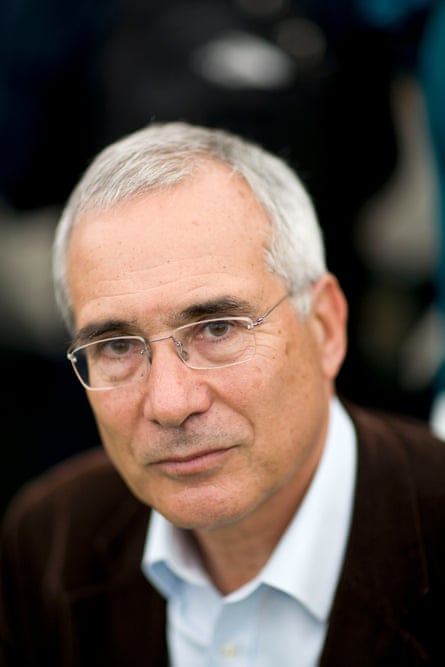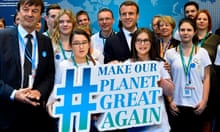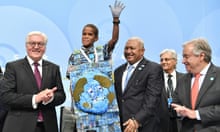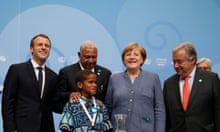Ministers from governments around the world meeting in Bonn for the final days of the UN climate talks must prove they can pass “the Trump test” by moving on without the US on issues crucial to combating global warming, a leading climate economist has said.
“It’s about getting on with it,” Lord Nicholas Stern told the Guardian. “They have to get on with it. But there are good signs.”
He said the recent meeting of the International Monetary Fund had proved countries were prepared to pass the test. “[We will have] the absence of the US for a little bit, but the determination at that meeting was striking. There is a determination to get on with things come what may.”
A former World Bank chief economist, Stern was the author of the landmark review of the economics of climate change in 2006, which showed that tackling greenhouse gas emissions sooner would cost less and yield more economic benefits than waiting for years, or decades, until the results of climate change are clearer.
The COP23 talks discussing crucial issues related to climate change began in the former West German capital, Bonn, last week and will finish on Friday. Ministers began arriving on Wednesday for the final “high-level segment” of the talks, which are expected to include toughening pledges to cut greenhouse gas emissions made at the historic Paris conference in 2015.
Trump has begun the process of US withdrawal from the Paris agreement, which will take several years, but in the meantime the US will continue to participate in the talks. So far, the US has taken little part in discussions, but this could change in the final days.

“Trump could be passive and do very little, or could be obstructive. I suspect the former, though not with great confidence,” said Stern. “The officials [sent by the US to Bonn] are a long way down the pecking order, which really suggests passive disengagement rather than an aggressive blocking strategy. But there is no predicting what the Trump administration will do.”
Stern said this was why other major countries bore a greater responsibility for making progress without the White House. He pointed to China and India, which he expected to play a strong role in furthering the Paris agreement.
“We should recognise that these countries are moving very quickly [on greenhouse gases],” he said. “My view is that [emissions from] China will peak by 2030. In India, the price of solar power has fallen to three cents a kilowatt hour [on a par with coal]. That is remarkable. The dial is really turning up in India now, which is really important.”
India has been a reluctant participant in previous talks. Six years ago, when the UN’s climate conference was held in Durban, India and China stood alone in holding out against the proposals which led to the Paris agreement. They eventually agreed, and China went on to take a leading role in the run-up to Paris, but India’s position has been less clear. The country’s prime minister made an angry speech in Paris saying that developed countries should take more responsibility, but the country signed up to the ensuing agreement and since then, according to Stern, there has been much more support within the Indian government.
Stern also called for more focus on the ways for poorer countries in particular to adapt to the effects of climate change. He said this should be known as fostering “resilience”, rather than adaptation as it used to be known, because resilience requires a broader range of measures and skills and it makes more sense to build and retrofit cities and infrastructure in such a way as to improve their resilience to all potential natural disasters, not just the effects of climate change.
He called for resilience to be built into all discussions on international development, in order to help the world’s poorest to cope with the social, economic and climate-driven problems that may arise, and in some cases are already taking place.









Comments (…)
Sign in or create your Guardian account to join the discussion